Taste of the Wild is a U.S.-based family-owned brand that offers both dry and wet food for cats and dogs. Their products are prepared by Diamond Pet Foods, a pet food manufacturer that also produce brands like Nutra Nuggets. The brand has earned a good reputation, thanks to its quality commitments, which are generally considered higher than the standard on the American market. But is it enough ? That’s what we’ll explore. Taste of the Wild claims to use high-quality, sustainable ingredients, including pasture-raised meats and wild-caught fish. Let’s take a closer look at the different recipes offered by Taste of the Wild to assess the strengths and weaknesses of this brand. The brand offers two ranges, one of which is called Prey. PREY is Taste of the Wild’s limited ingredient diet line.
✅ Pros
- Some Good Protein Sources: Animal proteins like pasture-raised bison, pasture-raised venison..
- No corn, gluten, soja in most recipes. Moderate use in others.
- Added Taurine : addressing concerns over cardiomyopathy over grain free recipes or support heart health.
- Adequate Macronutrient Balance: Some recipes offer a well-balanced ratio of protein, fat, and carbohydrates.
❌ Cons
- The nutritional content for ash, calcium, and phosphorus is not provided on the official website (we couldn’t find it anywhere else either).
- Some recipes include Canola oil, which has been the subject of debate in pet nutrition.
- Unknown Cooking Method: Crucial for evaluating nutrient retention. and to consider the impact of cooking on the formation of Advanced Glycation End Products (AGEs).
- Plant-Based Proteins: It is estimated that approximately 40% to 50% of the protein content may come from plant-based sources.
- Nutrient Representation: The nutrient levels for protein, fat, and minerals are listed as minimums rather than exact values, which may leave some uncertainty about the actual nutritional content.
- Unclear Professional Involvement: There’s no clear indication of whether a veterinarian or nutritionist or a professional formulator formulated or reviewed these recipes.
- Ingredients not explicitly labeled as human-grade.
- Presence of gluten : Barley (but only on few recipes).
Taste of The Wild Dog Dry Food Review Ratings
We will provide a detailed analysis of one recipe, followed by quick reviews of a few other recipes from the brand.
Taste of The Wild Ancient Mountain Canine Recipe
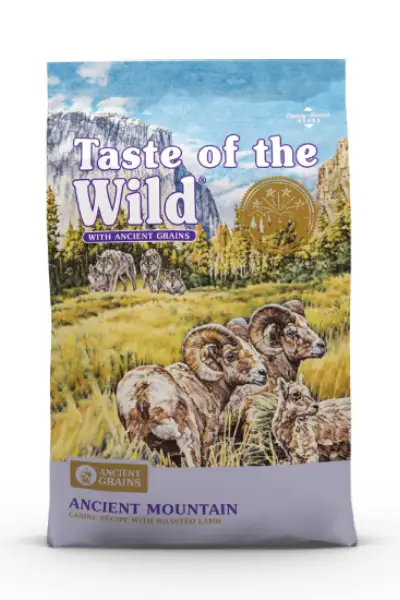

32/100
| Criterion | Evaluation | Comments |
|---|---|---|
| Carbohydrate content | 🔴 Disappointing – 37% | Higher level that may contribute to unwanted weight gain, unless paired with very intense physical activity. |
| Protein content | 🟠 Average – 27% | Exceeding the AAFCO minimum requirement of 18% for adult maintenance dog food. A protein content between 25% and 30% can be sufficient to maintain good overall health in dogs. However, for breeds prone to dermatological issues, those with significant muscle mass, or very active dogs, a higher intake of high-quality protein could be beneficial. |
| Protein to Calorie Ratio (PCR) | 🟠 Average – 69 | A relatively low protein density per calorie. This doesn’t seem optimal for muscle support in active dogs or muscular breeds. |
| Protein to Phosphorus Ratio (PPR) | ❓ Not specified | Unable to calculate due to lack of information. The PPR is crucial for assessing protein quality and kidney health implications. |
| Protein to Ash Ratio | ❓ Not specified | Unable to calculate due to lack of information. This ratio is essential for evaluating protein digestibility. and the quality of protein sources used. |
| Fat content | 🟢🟢 Excellent – 15% | Exceeding the AAFCO minimum requirement of 5,5% for adult minimum maintenance. This level is in line with the current market average and should suit most dogs. |
| Ash content | ❓ Not specified | It’s a key indicator of mineral content and overall ingredient quality. Without this, it’s difficult to fully assess the nutritional value of this food. |
| Fiber content | 🟢 Good – 3% | Also known as crude fiber. It’s a specific measure of insoluble fiber from plant cell walls. It’s primarily used to add bulk to stools and promote intestinal transit. The level here is is in line with the current market average |
| Moisture content | 🟢🟢 Excellent – 10% | Normal moisture level for dry dog food like kibble. |
| Calcium content | ❓ Not specified | Without this crucial information, it’s impossible to properly evaluate this dog food. This is essential information for your dog’s bone health and overall wellbeing. |
| Phosphorus content | ❓ Not specified | Insufficient information to make this calculation. Phosphorus levels are critical, especially for dogs with kidney issues or large breed puppies. |
| High Glycemic Index ingredients | 🟢 Good | It’s always preferable to choose low GI carbohydrate sources. For example: sweet potatoes. |
| Animal Protein Ratio | 🔴 Disappointing – 40-60% (estimation) | Animal proteins often provide a more complete amino acid profile for dogs but are typically more expensive than plant-based alternatives, which can also contribute to a balanced diet when properly formulated. |
| Quality of animal protein sources | 🟢 Good | High-quality, named animal protein sources should always be the first ingredients. Taste of the wild indicates using pasture raised animals in this recipe. |
| Types of preservatives used | 🟢 Good | Natural preservatives are used. |
| Manufacturing location transparency | 🟢 Good | Taste of the Wild indicates manufacturing locations. |
| Cooking method | ❓ Not specified | The cooking method significantly impacts nutrient preservation. |
| Quality and source of fats | 🟠 Average | There are some good sources like animal fat but also some controversial sources like canola oil. |
| Calcium to Phosphorus Ratio | ❓ Not specified | Insufficient information to make this calculation. This ratio is crucial for proper bone development and maintenance. Its absence is a significant concern. |
| Omega-6 to Omega-3 Ratio | 🔴 Disappointing – 7 | The balance between omega-3 and omega-6 could be improved, particularly to limit inflammation. |
| Brand transparency | 🔴 Disappointing | The brand could do much better Especially in certain rates. |
| Veterinarian-formulated recipes | ❓ Not specified | The lack of veterinary involvement in recipe formulation is concerning. |
| Non-GMO status | 🔴 Disappointing | The brand does not specify whether the ingredients used are genetically modified or not |
| Contains corn, gluten, wheat | 🟠 Average | Many dogs have sensitivities to these, and they’re often used as cheap fillers rather than for nutritional benefit. |
| Human-grade ingredients | 🔴 No | While not always necessary, human-grade ingredients often indicate higher quality and safety standards. |
| Organic certification | 🔴 No | The absence of organic certification is disappointing. Organic ingredients can reduce exposure to pesticides and other chemicals. |
| Formulas tested and backed by research | 🟢 Good | It’s positive that the formulas are tested. |
| Added taurine | 🟢 Taurine added | The addition of taurine is a positive feature. Especially important for grain-free diets to support heart health. |
Taste of The Wild Ancient Prairie Canine Recipe
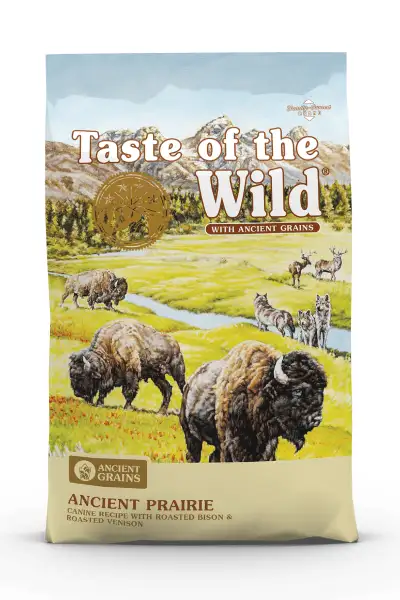

38/100
The protein levels in this recipe are better than the previous one, resulting in slightly lower carbohydrate content. The use of “pasture-raised” animal proteins is also a positive aspect. However, this does not offset the other concerns, such as the lack of crucial information on ash content, phosphorus, and calcium levels.
💪 Proteins: 32.0%
🥑 Fats: 18.0%
🌑 Ash: Not specified
🌾 Fiber Content: 3%
💧 Moisture: 10.0%
🦴 Calcium Content: Not specified
🧬 Phosphorus Content: Not specified
🔥 Metabolizable Energy: 3920 kcal/kg
🐟 Omega-3: 0.6%
🌻 Omega-6: 3%
🍞 Carbohydrate Content: 27%
⚖️ Protein/Calorie Ratio: 82.0
⚖️ Protein/Phosphorus Ratio: Not specified
🧮 Calcium/Phosphorus Ratio: Not specified
🔄 Omega-6/Omega-3 Ratio: 5.00
🐾 Animal protein: 60-70%
📈 High Glycemic Ingredients: No
🔄 Fat/Protein Ratio: 56.25
❌ Human Grade: No
🌽 Corn, Gluten, Wheat, Soja: Moderate use of gluten
🔧 Chelated Minerals: No or not specified
Taste of The Wild Pacific Stream Canine Recipe
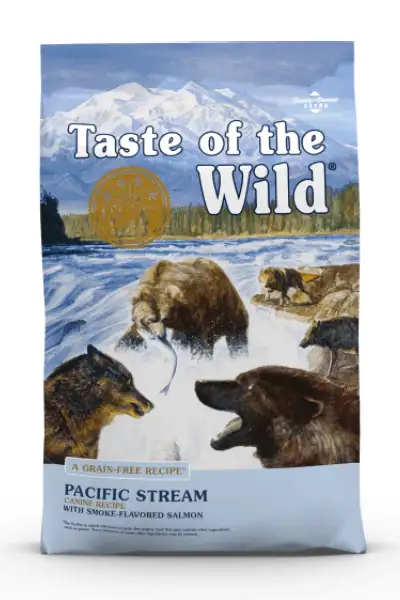

37/100
A recipe that includes fish, which is always a good idea to diversify protein sources and prevent dietary monotony. There’s not much else to add here, as this recipe doesn’t stand out from the others.
💪 Proteins: 25.0%
🥑 Fats: 15.0%
🌑 Ash: Not specified
🌾 Fiber Content: 4%
💧 Moisture: 10.0%
🦴 Calcium Content: Not specified
🧬 Phosphorus Content: Not specified
🔥 Metabolizable Energy: 3600 kcal/kg
🐟 Omega-3: 0.3%
🌻 Omega-6: 2.4%
🍞 Carbohydrate Content: 36%
⚖️ Protein/Calorie Ratio: 69.0
⚖️ Protein/Phosphorus Ratio: Not specified
🧮 Calcium/Phosphorus Ratio: Not specified
🔄 Omega-6/Omega-3 Ratio: 8.00
⚖️ Animal proteins: 60-70%
⚖️ High Glycemic Ingredients:: None
🔄 Fat/Protein Ratio: 60.00
❌ Human Grade: No
🌽 Corn, Gluten, Wheat, Soja: No
🔧 Chelated Minerals: No or not specified
Taste of The Wild High Prairie Canine Recipe
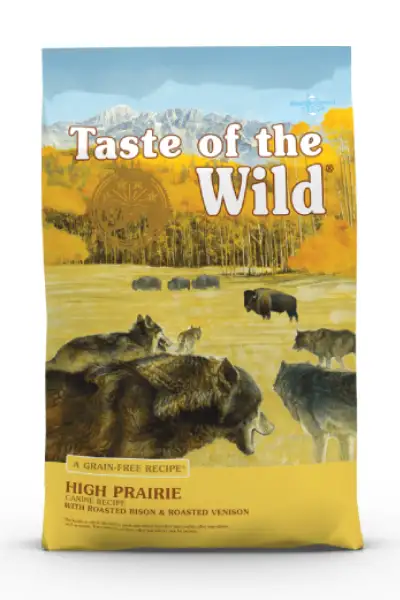

41/100
Still a good balance of protein and fat. This recipe would deserve a higher rating with greater transparency from the brand—what a shame! We appreciate the proportion of animal proteins, which appears to be close to 70%.
💪 Proteins: 32.0%
🥑 Fats: 18.0%
🌑 Ash: Not specified
🌾 Fiber Content: 4%
💧 Moisture: 10.0%
🦴 Calcium Content: Not specified
🧬 Phosphorus Content: Not specified
🔥 Metabolizable Energy: 3719 kcal/kg
🐟 Omega-3: 0.3%
🌻 Omega-6: 2.4%
🍞 Carbohydrate Content: 26%
⚖️ Protein/Calorie Ratio: 86.0
⚖️ Protein/Phosphorus Ratio: Not specified
⚖️ Calcium/Phosphorus Ratio: Not specified
⚖️ Omega-6/Omega-3 Ratio: 8.00
⚖️ Animal proteins: 60-70%
⚖️ High Glycemic Ingredients:: None
⚖️ Fat/Protein Ratio: 56.25
⚖️ Human Grade: No
⚖️ Corn, Gluten, Wheat, Soja: No
🔧 Chelated Minerals: No or not specified
Taste of The Wild High Prairie Puppy Recipe
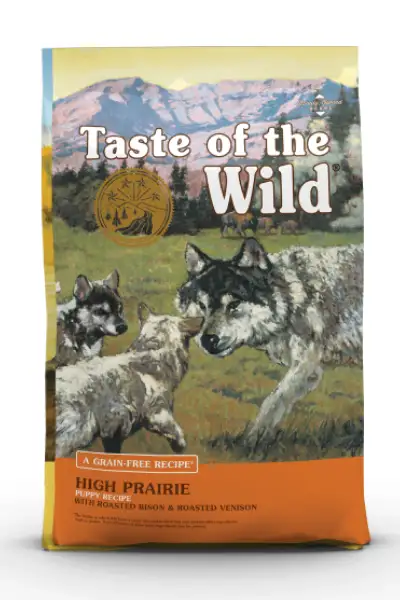

37/100
The levels here are a bit surprising. Puppy kibble is usually enriched with higher fat, protein, and energy density, but that’s not the case here. In fact, it’s the opposite.
💪 Proteins: 28.0%
🥑 Fats: 17.0%
🌑 Ash: Not specified
🌾 Fiber Content: 5%
💧 Moisture: 10.0%
🦴 Calcium Content: Not specified
🧬 Phosphorus Content: Not specified
🔥 Metabolizable Energy: 3656 kcal/kg
🐟 Omega-3: 0.3%
🌻 Omega-6: 2.8%
🍞 Carbohydrate Content: 30%
⚖️ Protein/Calorie Ratio: 77.0
⚖️ Protein/Phosphorus Ratio: Not specified
🧮 Calcium/Phosphorus Ratio: Not specified
🔄 Omega-6/Omega-3 Ratio: 9.33
⚖️ Animal proteins: 60-70%
⚖️ High Glycemic Ingredients:: None
🔄 Fat/Protein Ratio: 60.71
❌ Human Grade: No
🌽 Corn, Gluten, Wheat, Soja: No
🔧 Chelated Minerals: No or not specified
Taste of The Wild Turkey Limited Ingredient Recipe
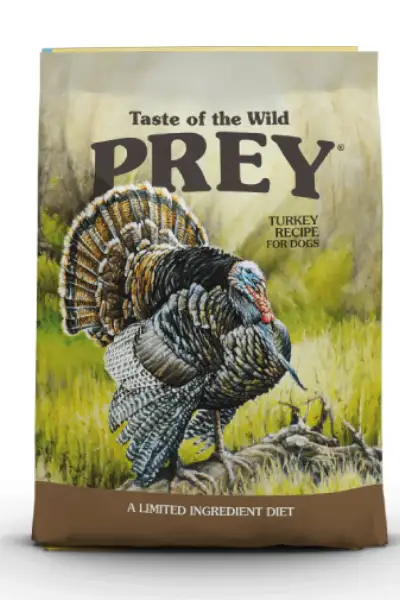

38/100
The “limited ingredients” range is an interesting concept and likely promotes better digestion. It’s close to a single-protein recipe. The carbohydrate level is also quite good.
💪 Proteins: 30.0%
🥑 Fats: 15.0%
🌑 Ash: Not specified
🌾 Fiber Content: 5%
💧 Moisture: 10.0%
🦴 Calcium Content: Not specified
🧬 Phosphorus Content: Not specified
🔥 Metabolizable Energy: 3670 kcal/kg
🐟 Omega-3: 0.5%
🌻 Omega-6: 2.5%
🍞 Carbohydrate Content: 30%
⚖️ Protein/Calorie Ratio: 82.0
⚖️ Protein/Phosphorus Ratio: Not specified
🧮 Calcium/Phosphorus Ratio: Not specified
🔄 Omega-6/Omega-3 Ratio: 5.00
⚖️ Animal proteins: 60-70%
⚖️ High Glycemic Ingredients:: None
🔄 Fat/Protein Ratio: 50.00
❌ Human Grade: No
🌽 Corn, Gluten, Wheat, Soja: No
🔧 Chelated Minerals: No or not specified
Our Opinion
Taste of the Wild is a brand with potential but consumers may benefit from additional clarity on certain key points regarding nutritional information. We were particularly surprised by the composition of the Puppy formulas. Unlike many other brands that typically increase certain nutrient levels in their puppy food, Taste of the Wild does not seem to follow this common practice. Overall, the macronutrient profile for recipes appears to meet general industry standards.

